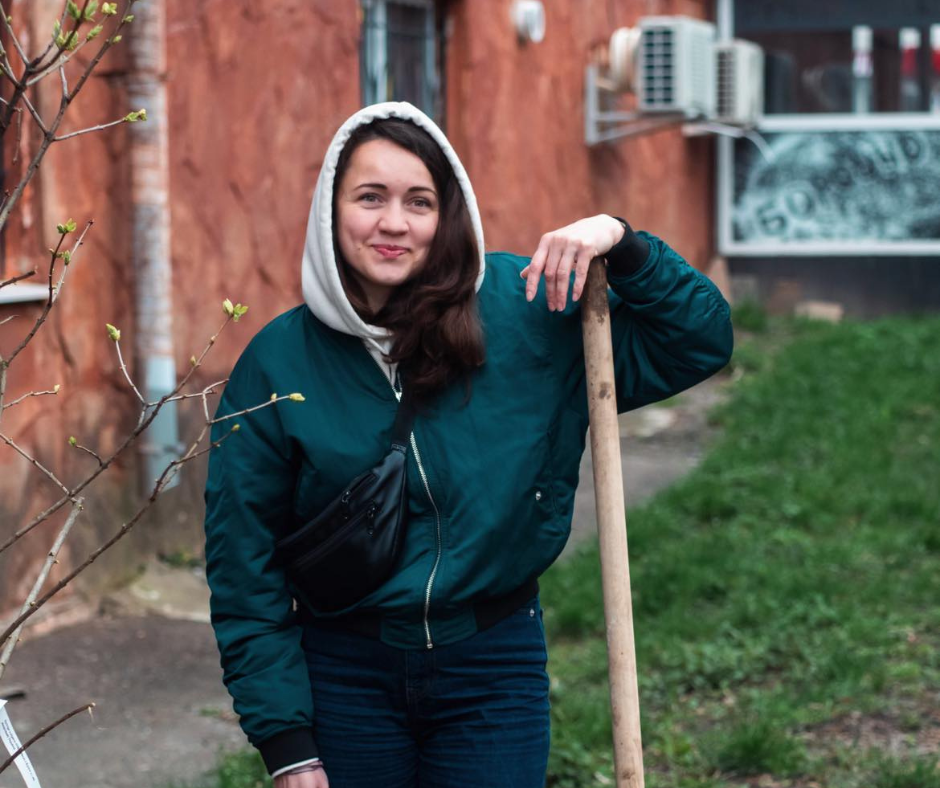Oksana Maiboroda has been a civic activist promoting quality landscaping in Rivne for several years. As part of the Trees Stories initiative, she and other group members developed the restoration concept of Hrabnyk Park. They launched the reconstruction of this green space for recreation in the city with elements of barrier-free accessibility and climate change adaptation.
Before the full-scale war, Oksana ran for the Rivne City Council because she was fed up with begging deputies and officials to change their approaches to caring for green areas.
In an interview with Ecoclub, Oksana told us what she has managed to implement during her years as a deputy, whether she faced prejudice during her work, and how she sees the community in 10 years.
– Tell us, what made the civic activist become a deputy? What was the reason for this?
As an activist, it was difficult to promote high-quality landscaping in the city and convince local authorities of its expediency. I became a deputy because I wanted to implement environmental reforms in the city, improve the condition of green spaces, and get involved in implementing nature-based solutions. Activists can influence the authorities, but sometimes, this process is long or unsuccessful. I was tired of begging the authorities and filed my candidacy for the council.
– What was the main focus of your work as a deputy?
As a deputy, I wanted to reform urban landscaping, change approaches to household waste management, and reform the work of utility companies.
– Why urban greening reform?
In 2015, she and other activists created the Trees Stories public initiative. Its initial goal was to help people plant trees in the city to mark important life events. They talked to the city authorities and the head of the communal non-commercial enterprise “Trest zelenoho hospodarstva” about agreeing on locations. At that time, neither the authorities nor the Trust were particularly helpful in implementing our initiative, although they seemed to support it verbally.
Later, we began to study in detail how the city’s greenery maintenance system was organized and saw many gaps. We analyzed the estimates and noticed that the city spends more on tree removal than planting. And its quality does not meet European standards, i.e., “money down the drain.”
The city also allocates several million hryvnias from the budget to purchase annual flowers and tulip bulbs yearly. They can be planted, but it is more rational to order bulbs that do not require digging. And to combine them with perennials that cover the soil, absorb and retain moisture better, and are cheaper and easier to maintain than annuals.
Other problems include mowing the grass during the heat wave. In 2019, the Trees Stories petitioned the city to provide watering for trees and limit lawn mowing in the heat. Every year, 3-4 million hryvnias are spent on mowing.
Extract from the petition: Hand-held brush cutters can damage the lawn and leave “bald” soil, tearing out grass with roots because the plastic blades of such mowers are not sharp. Mowing the grass “to the ground” destroys biodiversity and the disappearance of wild plants and invertebrates. During the day’s heat, the open ground warms up at the level of asphalt and pavement, and the temperature can reach more than 40 °C.
Another major problem in the city is solid waste management. There is an open-type landfill near Rivne, where cases of fires in the hot season are recorded every year. This affects the environment and human health: city residents breathe polluted air. So, if we don’t change the waste management system, the problem will grow and require much more resources to solve.
– What have you managed to achieve over the years as a deputy?
I was involved in the initiative to develop a waste management roadmap, “Rivne Community without Garbage by 2030”. Environmental issues in the community have been slowed down during the full-scale war. It is impossible to implement waste reform without conducting a number of studies, developing feasibility studies to understand the amount of funds to be raised, creating pilot projects of green islands in neighborhoods, and introducing separate waste collection (organic waste should be separate). The Department of Economy proposed an annual action program to implement the roadmap, but the city council did not support it.
We continue to reconstruct the Park on Hrabnyk and raise sponsorship funds. This year, we will rethink the park’s concept, implement barrier-free solutions, and develop a space for teenage children. We also plan to prioritize installing a sustainable drainage system along the main alley to the tower, which will absorb rainwater, helping the Park survive all three of the most predictable climate risks for Rivne: extreme heat, drought, and extreme rainfall.
Before the war, I created a public budget for landscaping, which has been practiced for many years in the Polish city of Lublin. A competition was held, during which we received about 30 applications.
We partially achieved our goal: some community members learned about the need to implement nature-based solutions, while others better understood the approaches to planting and caring for green spaces. Unfortunately, the war messed things up, so the projects were never implemented. However, the initiative is important for improving the quality of life for Rivne residents who would be involved in creating green areas, parks, and recreational spaces. Therefore, I plan to initiate a return to the implementation of public green projects.
– How have the city leaders’ beliefs about the importance of climate change adaptation and natural areas preservation changed?
It is difficult to convince the majority because the topic does not seem relevant to the vision of the city’s leaders, and everyone knows that it is not “the right time” for environmental issues. However, the city council recently approved the Concept “Blue and Green Corridors of the Rivne City Territorial Community” at a session. This guides the community in implementing climate change adaptation and biodiversity conservation measures, developing a network of accessible and safe ways for residents to move around. Its implementation will help create a comfortable environment based on sustainability, convenience, and environmental respect.
In addition, with the participation of landscape architecture experts, we have developed schemes for employees of public utilities, which will make it easier for them to arrange flower beds with perennials following the best European practices. There is also a list of plants that we have tested for planting in other city locations. If the city plants perennials, it will be easier for residents to adapt to climate change.
– Have you been involved in changing the approaches to the work of the utilities you mentioned?
Of course, I was involved in changes in the work of the communal non-commercial enterprise “Trest zelenoho hospodarstva”. However, the management ignored my suggestions. Thanks to the support of my colleagues, I managed to convince some decision-makers of the importance of developing perennial greenery in the community. And this year, the Green Trust will plant more perennials. Several flower beds with perennial flowers and herbs have already been created, and bushes and trees will be planted in the fall.
– Have you faced any prejudice during your time as a deputy?
I had a feeling of rejection of my professionalism and expertise in sustainable development. I have to make many efforts to promote qualitative changes in the community. However, over time, I have found like-minded people who help convince others of the importance of implementing climate change adaptation measures.
It was also difficult to find support for what I was doing. However, with the first results, there was hope for implementing other useful things in the community. Rivne residents see the changes and join in: they come to clean-ups and tree plantings. Only together can we achieve qualitative changes, create coziness, and make the city more comfortable to live in.
– Have you noticed the change in how Rivne residents feel about greenery in the city?
Their attitudes seem positive, but changing their view of quality landscaping and its benefits still takes time. It is important that more people help promote more sustainable solutions. In particular, they need to request the creation of urban meadows. The more there are, the fewer pests, ticks, and mosquitoes there are. Creating meadows instead of mowing the grass will help preserve local biodiversity and community comfort.
If Rivne residents do not demand changes, the city will decline.
– How do you see the community in 10 years?
We are currently working on the idea of creating a Garden of Memory. We want to support people who have lost loved ones in the war with the help of landscaping. This is a jointly created space where people can be alone with their thoughts in unity with nature.
Also, as part of the Blue and Green Corridors of Rivne concept, we plan to improve the condition of water bodies in the city and develop barrier-free ecological trails. Many people escape from the city noise and relax in nature. We aim to bring nature and clean water bodies back to the city. European cities set such goals, and it is important for us to join forces and improve the environment in ours because we live here. Our communities need a green transformation.
This article was written within the framework of the project “Building the Ecofeminist Movement,” funded by WECF International (Women in Europe for a Common Future).
Opinions, conclusions, or recommendations are those of the authors and do not necessarily reflect the views of WECF International. The content is the sole responsibility of the NGO “Ecoclub”.












